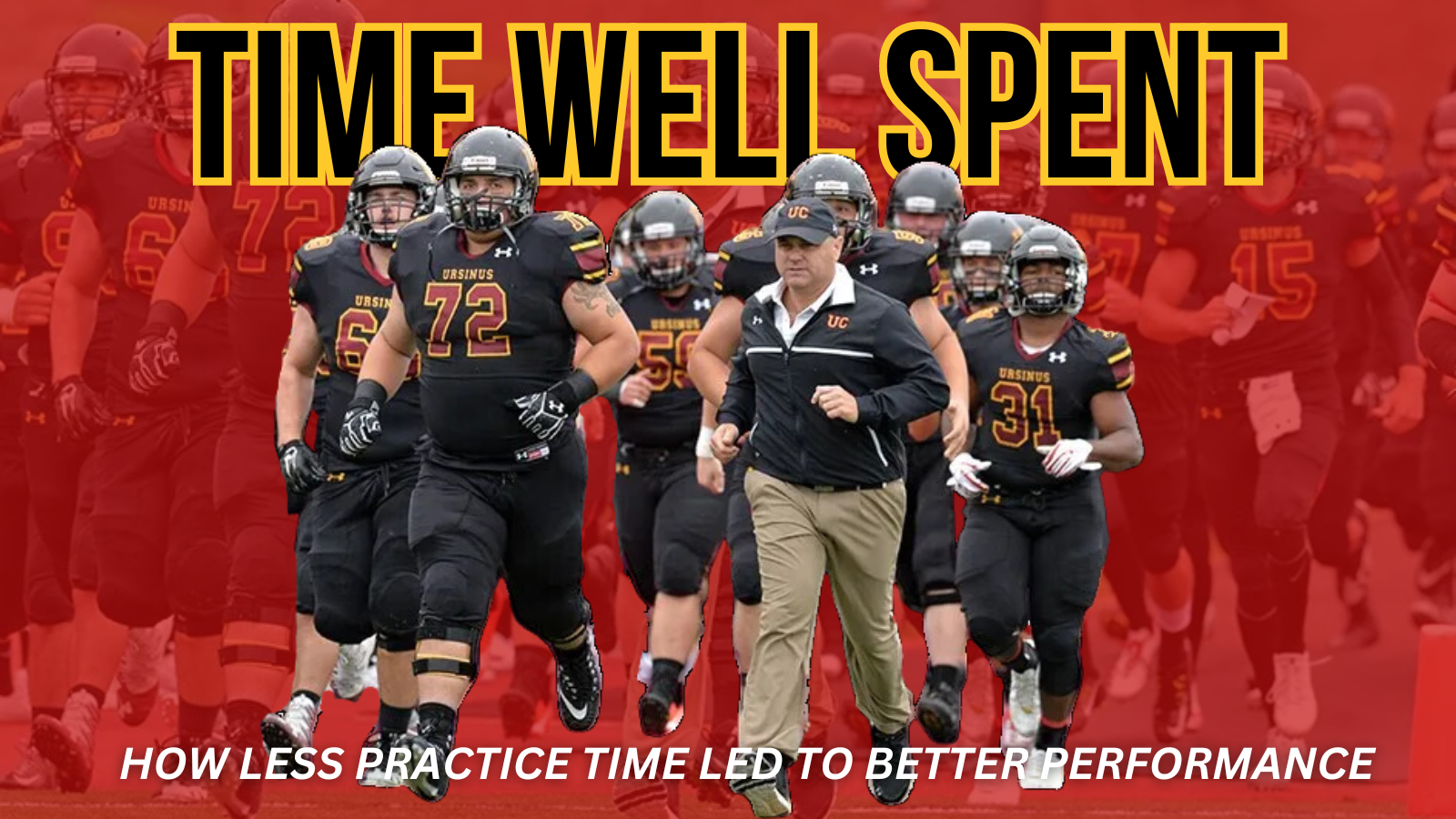
The “grind” is often seen as the pathway to success, but Ursinus College head coach Peter Gallagher took a different approach. Gallagher and his staff found that less time on the field—strategically managed—could lead to better results, both for their players and for the coaches themselves. Their changes enhanced the team’s performance and promoted a healthier, more sustainable environment.
Breaking Away from the Grind Mentality
When Gallagher first took over as head coach at Ursinus, he believed in the value of relentless work. The standard was the long hours spent at the office, grueling practices, and exhaustive preparation. But after years of the same routine, Gallagher realized that more time in the office didn’t necessarily translate to better outcomes on the field.
“The thought that you have to guard your desk and sit there all day, grinding, is just false,” Gallagher says. “We used to bring the staff in after practice, upload the film, sit around watching it until 10 p.m., and then get home exhausted, only to start the next day drained.”
By midseason, both the coaches and players would feel burnt out. It wasn’t sustainable, and Gallagher knew it. He also knew there had to be a better way—one that didn’t leave everyone running on fumes by Week 7.
Shifting Focus to Efficiency
Gallagher’s lightbulb moment came when he focused on efficiency rather than time spent. He started by trimming unnecessary hours off the weekly routine, beginning with Sunday. In the past, the Ursinus staff would spend up to 10 hours in the office on Sundays, breaking down film and prepping for the upcoming week. Gallagher found that this schedule wasn’t benefiting anyone, so he shifted gears.
“Now, we give our players Sunday off,” he explains. “Our staff doesn’t come in for 10 hours, and we don’t bring the kids in either. Most of our players are local, so they spend time with their families, watch NFL games, or relax. It gives everyone a chance to recharge.”
Instead of starting the week exhausted, the Ursinus players and staff now arrive on Monday morning fresh and ready to go. Practices start at 6:30 a.m., with a clear, focused plan in place. The results were immediate—players were more engaged, coaches had more energy, and the team performed better on the field.
Cutting Back, Gaining More
Perhaps the most surprising change Gallagher made was to reduce the overall time his team spends on the field each week. While many teams pride themselves on grinding out long daily practices, Ursinus now practices for just six hours a week. Fridays, which once involved pre-game conditioning, are now reserved for a brief walkthrough lasting only 20 minutes.
“We prepare for six hours and 20 minutes total for each game,” Gallagher explains. “That’s all the field time we need. The rest is in the preparation, the focus, and ensuring we maximize the time we spend together.”
The reduction in field time allowed the players to maintain higher energy and enthusiasm throughout the season. Gone are the days of tired legs and mental fatigue. By focusing on quality over quantity, Ursinus has found that less really is more.
Energy Breeds Excellence
One key benefit of Gallagher’s time management overhaul is the increased energy in the coaching staff-player relationship. By eliminating the late-night film sessions and cutting back on practice hours, the coaches became more engaged and effective.
“We’re not sitting in the office until 10 p.m. anymore,” Gallagher says. “We’re not grinding ourselves down, eating bad food late at night, and showing up exhausted the next day. That shift has greatly impacted how we coach and relate to the players.”
This new structure has made football something the players look forward to. Practices are sharper, and the shorter, more focused sessions mean they give their best effort each time they hit the field. The positive energy from the coaching staff trickles down to the team, creating an atmosphere of enthusiasm and shared commitment.
A Model for Success
Since making these changes, Ursinus football has only gotten better. The past three seasons, they are 24-9 and off to a 3-0 start in 2024. The results speak for themselves, but Gallagher’s real pride comes from seeing his players and staff thrive. The shift from the old grind mentality to a more balanced, efficient approach has allowed them to enjoy the journey without losing sight of their goals.
“The journey is the reward,” Gallagher says. “When your team is excited to come to practice when they feel fresh and motivated, you will see success. It’s not about how many hours you spend but how you use them.”
In a sport where the grind is glorified, Ursinus football proves that sometimes, a step back is the key to progress. Coach Gallagher, his staff, and his team have maximized their energy, enthusiasm, and, ultimately, their success by managing time more effectively.
D3 Head Coach and Staff of the Week

Peter Gallagher and his staff were recognized as the Coach and Coordinator D3 Head Coach and Staff of the Week presented by Hansen Ratings for Week 3 of the season.
Notable Stats from Ursinus’s 58-14 win over Rowan:
- Outgained opponent 599 to 112
- Rush for 457 yards on 7.8 ypc
- Five sacks and 10 total TFL, including 3 sacks & a safety from Connor Carter
- Game was tied middle of 2nd quarter before scoring 6 straight TDs & allowing 1 first down over next quarter & a half


